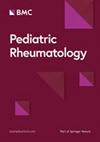继发于 Nivolumab 和 Ipilimumab 的检查点抑制剂免疫疗法诱发的炎性关节炎:儿科首例病例
IF 2.8
3区 医学
Q1 PEDIATRICS
引用次数: 0
摘要
在过去十年中,免疫检查点抑制剂(ICIs)扩大了癌症治疗药物的范围,但也带来了一系列免疫相关不良事件(irAEs),包括炎症性关节炎。虽然这些并发症在成年人群中越来越多地被发现,但儿科文献中还没有关于炎症性关节炎 irAEs 的报道。一名患有转移性上皮样间皮瘤的14岁女性患者在接受第二个周期的Nivolumab和Ipilimumab治疗后,双侧肩部、髋部和手部小关节出现进行性炎性关节疼痛,随后被转诊至儿科风湿病门诊。初步检查显示双侧肩关节线压痛、双侧FABERs试验阳性、双侧大转子压痛和双侧第二跖趾积液。她的血清学特征为HLA-B27阳性、抗CCP阳性、类风湿因子阴性和ANA阴性。PET-CT 扫描显示对称性代谢活动增加,主要涉及冈上肌、臀中肌、臀小肌和半膜肌腱插入处。她的表现与 1 级虹膜急性炎症反应一致,尽管接受了非甾体抗炎药物治疗,但病情仍恶化为 2 级虹膜急性炎症反应,因此需要短期口服泼尼松龙。在接受了六个周期的 Nivolumab 和 Ipilimumab 治疗后,她的间皮瘤得到了临床缓解,她的炎性关节炎也在西乐葆单药治疗下得到了控制。据我们所知,这是首例 ICI 引发的炎症性关节炎和关节内膜炎的儿科病例。该病例强调了提高对儿童irAEs诊断和管理认识的重要性。本文章由计算机程序翻译,如有差异,请以英文原文为准。
Checkpoint inhibitor immunotherapy induced inflammatory arthritis secondary to Nivolumab and Ipilimumab: a pediatric first
Immune checkpoint inhibitors (ICIs) have expanded the arsenal of cancer therapeutics over the last decade but are associated with a spectrum of immune-related adverse events (irAEs), including inflammatory arthritis. While these complications are increasingly recognized in the adult population, no cases of inflammatory arthritis irAEs have been reported in the pediatric literature. A 14-year-old female with metastatic epithelioid mesothelioma was referred to the pediatric rheumatology clinic after developing progressive inflammatory joint pain in her bilateral shoulders, hips, and small joints of hands following the second cycle of Nivolumab and Ipilimumab. Initial examinations showed bilateral shoulder joint line tenderness, positive FABERs test bilaterally, tenderness over bilateral greater trochanters, and bilateral second PIP effusions. Her serological profile was notable for positive HLA-B27, positive anti-CCP, negative Rheumatoid Factor, and negative ANA. PET-CT scan performed for disease response following immunotherapy showed symmetric increased metabolic activity primarily involving the supraspinatus, gluteus medius and minimus, and semimembranosus tendon insertions. Her presentation was consistent with a grade 1 irAE that worsened to a grade 2 irAE despite NSAID therapy, prompting a short course of oral prednisolone. She achieved clinical remission of her mesothelioma following six cycles of Nivolumab and Ipilimumab and her inflammatory arthritis was controlled on Celebrex monotherapy. To our knowledge, this is the first pediatric case of ICI-induced inflammatory arthritis and enthesitis. This case highlights the importance of increasing awareness of diagnosis and management of irAEs in children.
求助全文
通过发布文献求助,成功后即可免费获取论文全文。
去求助
来源期刊

Pediatric Rheumatology
PEDIATRICS-RHEUMATOLOGY
CiteScore
4.10
自引率
8.00%
发文量
95
审稿时长
>12 weeks
期刊介绍:
Pediatric Rheumatology is an open access, peer-reviewed, online journal encompassing all aspects of clinical and basic research related to pediatric rheumatology and allied subjects.
The journal’s scope of diseases and syndromes include musculoskeletal pain syndromes, rheumatic fever and post-streptococcal syndromes, juvenile idiopathic arthritis, systemic lupus erythematosus, juvenile dermatomyositis, local and systemic scleroderma, Kawasaki disease, Henoch-Schonlein purpura and other vasculitides, sarcoidosis, inherited musculoskeletal syndromes, autoinflammatory syndromes, and others.
 求助内容:
求助内容: 应助结果提醒方式:
应助结果提醒方式:


